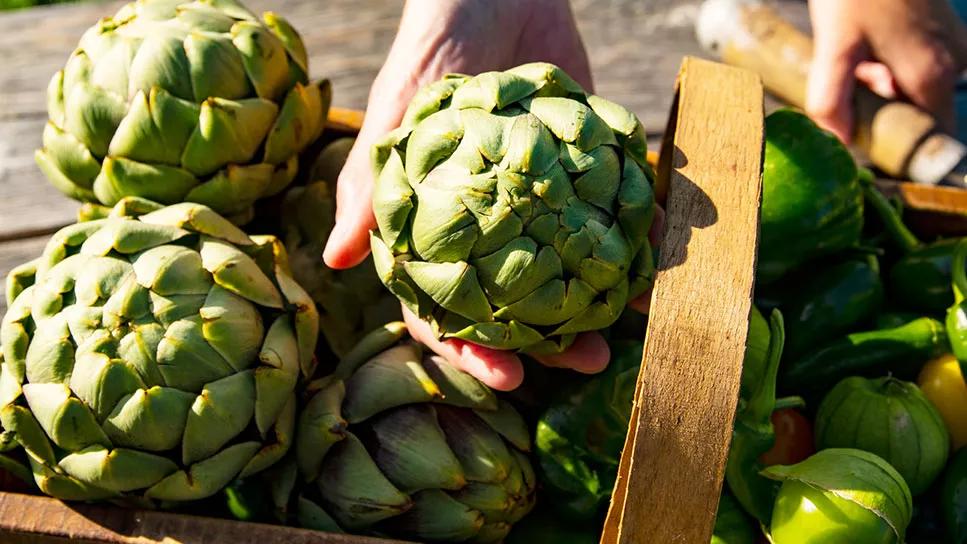This unique-looking veggie is fiber-dense and antioxidant-rich, and can improve the health of your gut, liver and heart

You’ve probably seen artichokes in the produce section or as an appetizer on restaurant menus. With their spiky outer leaves, artichokes can look intimidating. But you can buy the vegetable (it’s actually the immature flower of a thistle plant) frozen or canned and ready to eat.
Advertisement
Cleveland Clinic is a non-profit academic medical center. Advertising on our site helps support our mission. We do not endorse non-Cleveland Clinic products or services. Policy
“Artichoke hearts are soft and meaty,” says registered dietitian Beth Czerwony, RD, LD. “But the plant’s petals and stems are equally tasty and nutritious. They’re not as difficult to prepare as people think.”
Artichokes are chock-full of vitamins, nutrients and disease-fighting phytochemicals. Czerwony shares 10 reasons artichokes are an okey-dokey artichoky addition to your dinner table.
A large artichoke has 76 calories, 17 grams of carbohydrates and zero cholesterol or fat. Nutrient-wise, a large artichoke has approximately:
Natural plant chemicals (phytochemicals) in artichokes protect against bacteria, fungi, parasites and viruses. “Phytochemicals have antioxidant properties, so you get some of the same protections when you eat the plant,” notes Czerwony.
Advertisement
Antioxidants lessen the damaging effects of free radicals. These molecules cause cell damage that may increase your risk of cancer, autoimmune diseases and Alzheimer’s disease.
Research from the U.S. Department of Agriculture (USDA) found that artichokes have the second-highest antioxidant content of all vegetables. (Only beans fare better.) One cup of artichoke hearts has close to 8,000 total antioxidants.
Cynarin, a phytochemical in artichokes, can lower cholesterol. Cholesterol, a waxy substance that collects in your arteries, can lead to coronary artery disease and heart disease.
A study of people who took artichoke leaf extract for six weeks showed an 18% drop in cholesterol levels compared with those given a placebo. “Artichokes can be a great addition to a heart-healthy diet — as long as you don’t always eat them with cheese, butter and other high-fat ingredients,” says Czerwony.
Cynarin also helps your liver make bile. Your body uses this fluid to break down foods, absorb vitamins and remove toxins. In one study, participants took artichoke leaf extract for two months. Researchers found a 26% decrease in irritable bowel syndrome (IBS) symptoms and a 40% decrease in upset stomach symptoms.
Participants also reported a 20% improvement in their quality of life. “Meals that include artichokes may help improve your gut health naturally,” Czerwony says.
Artichokes also have silymarin. This flavonoid, or plant-based chemical, protects against liver damage. As early as the first century A.D., Greek and European physicians used silymarin extract made from dried artichoke seeds and milk thistle plants to treat jaundice and other liver problems. Studies show silymarin can improve cirrhosis and fatty liver disease symptoms and may even reduce deaths.
A large artichoke has 9 grams of fiber — that’s more than a cup of prunes — making it one of the best high-fiber foods you can eat. It’s also a good source of inulin. “This soluble fiber makes you feel full,” explains Czerwony. “As a result, you’re less likely to overeat or have blood sugar spikes that make you crave sweets.”
Inulin is also a prebiotic. Healthy bacteria in your gut use prebiotics and probiotics (also found in artichokes) to keep your bowels regular and prevent constipation.
For a plant, artichokes are surprisingly high in protein. One artichoke has about 5 grams of protein. In addition to making you feel full, protein helps your body repair tissues and muscles.
Advertisement
Studies also show that eating more plant-based protein versus animal-based protein can lower your risk of heart disease. “Artichokes are a good source of protein for those who follow a vegetarian or vegan meal plan,” Czerwony adds.
A large artichoke has 600 milligrams of potassium, which helps your heart and kidneys work well. Potassium also lowers blood pressure. A 2021 systemic review of eight studies found that taking artichoke supplements for 12 weeks significantly lowered high blood pressure.
Polyphenols, a type of antioxidant compound, are plentiful in artichokes. These compounds help your body fight inflammation that can cause cancer. They also stop cancer cells from multiplying and growing.
Several studies suggest artichokes and artichoke leaf extract can prevent or help manage:
One large artichoke has close to 100 milligrams of magnesium, more than 20% of the recommended daily intake. Studies suggest magnesium promotes better sleep, especially if you experience insomnia. This essential mineral (electrolyte) also helps keep your heart in rhythm, preventing heart palpitations.
Artichokes — fresh, frozen or canned — are easier to incorporate in dishes at home than you might think. Give these recipes a try:
Advertisement
Advertisement
Learn more about our editorial process.
Advertisement

The tropical fruit is a good source of antioxidants and vitamin C

High amounts of cholesterol and saturated fat in red meat may be linked to heart disease

The leaves and pods from this tree are rich in essential nutrients

This starchy root vegetable is a staple in many global cuisines — but it has to be prepared correctly, or it can cause serious concerns

These delicate green sprouts can give you an extra dose of vitamin K and other nutrients — but they’re not safe for everyone

Edamame, lentils and chicken breast are good sources of protein

Eating this root vegetable can help support your eye, heart and brain health

The flavorful herb is full of antioxidants that may help regulate blood sugar

Wearing a scarf, adjusting your outdoor activities and following your asthma treatment plan can help limit breathing problems

Your diet in the weeks, days and hours ahead of your race can power you to the finish line

When someone guilt trips you, they’re using emotionally manipulative behavior to try to get you to act a certain way